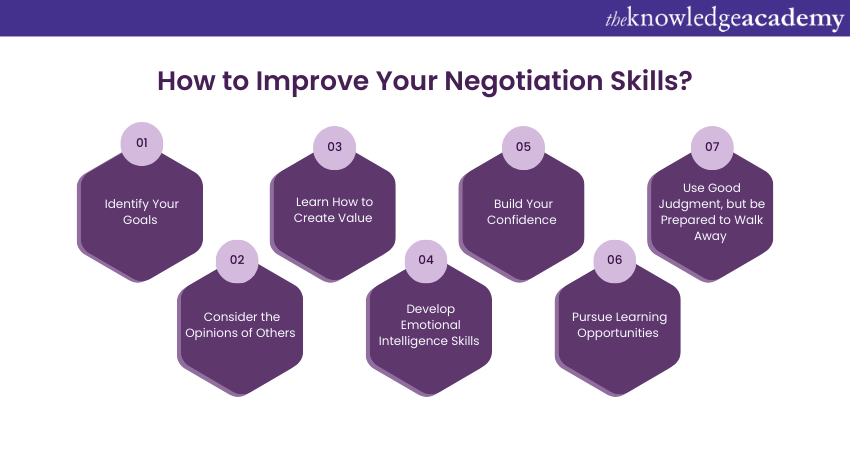We may not have the course you’re looking for. If you enquire or give us a call on +43 720 115337 and speak to our training experts, we may still be able to help with your training requirements.
Training Outcomes Within Your Budget!
We ensure quality, budget-alignment, and timely delivery by our expert instructors.

Have you ever found yourself wondering How to Improve Negotiation Skills and achieve better outcomes in your personal and professional life? Negotiation skills involve strategic collaboration between individuals to reach mutually agreed-upon outcomes. While this learning trajectory can be demanding, mastering these skills can lead to significant benefits.
Imagine confidently navigating conflicts and reaching agreements that benefit all parties involved. By developing key strategies such as active listening, effective communication, and a collaborative mindset, you can enhance your Negotiation abilities and achieve your goals with greater ease.
If you’re eager to start your journey in developing Negotiation Skills, this blog is for you. Learn How to Improve Negotiation Skills with expert tips, build your confidence, and become a successful negotiator. Read ahead to discover more!
Table of Contents
1) What are Negotiation Skills?
2) Benefits of Improving your Negotiation Skills
3) How to Improve your Negotiation Skills?
a) Identify your Goals
b) Consider the Opinions of Others
c) Learn How to Create Value
d) Develop Emotional Intelligence skills
e) Build Your Confidence
f) Pursue Learning Opportunities
g) Use Good Judgment, but be Prepared to Walk Away
4) Conclusion
What are Negotiation Skills?
Negotiation Skills comprise the abilities that enable individuals to communicate, collaborate, and reach mutually satisfactory agreements effectively. These skills are crucial in various aspects of life, including business, personal relationships, and everyday interactions.
Effective Negotiation involves understanding the needs and interests of both parties, actively listening, and using persuasive communication techniques. It requires the ability to analyse and evaluate different options, make informed decisions, and find creative solutions that fulfil the interests of all parties involved.
Furthermore, a Skilled Negotiator knows how to set clear objectives, conduct thorough research, and build rapport and trust with the other party. They are adept at managing emotions and diffusing difficult situations, remaining calm and composed even in high-pressure scenarios.
Moreover, adaptability is another significant aspect of Negotiation Skills. Successful negotiators can adjust their approach to different Negotiation styles and personalities, understanding when to be assertive and cooperative. They are open to alternative viewpoints and willing to compromise when necessary, always striving for win-win outcomes.
More importantly, continuous learning and improvement are essential for honing Negotiation Skills. Seeking feedback, reflecting on past experiences, and staying updated with best practices contribute to becoming a more effective negotiator.
Benefits of Improving Your Negotiation Skills
Negotiation is a life skill, not just a talent for top-tier business executives and hostage crisis professionals. It occurs in everyday situations, like couples deciding on vacation destinations or families choosing a movie.
1) Enhancing your Negotiation Skills offers numerous benefits, such as:
2) Boosting and building self-confidence
3) Securing the best possible deals and maximum value
4) Resolving conflicts, issues, and problems effectively
5) Earning respect and building a positive reputation
6) Advancing in your career path
7) Strengthening personal and professional relationships
How to Improve Your Negotiation Skills?
The Skills of Negotiation comes naturally to certain individuals, though it is also a skill that can be worked on with time. Here is a list of proven methods to learn How to Improve Negotiation Skills:

1) Identify Your Goals
It is essential for individuals interested to be involved in a Negotiation, to know exactly what they want to gain out of the agreement. They also must know the extent until which they are ready to compromise. Consider the example of a Negotiation where the objective is to be offered 80,000 GBP as a salary, though an individual may be willing to compromise until 75,000 GBP.
The individual can consider reflecting on the following questions to better identify their Negotiation goals:
a) What are the minimum terms I require?
b) How much am I ready to Negotiate?
Are my goals realistic enough for this job position or the industry?
2) Consider the Opinions of Others
Good negotiators are generally of the determined and decisive kind. However, it is especially important to note that their empathic skills and ability to understand the motivations of other people can significantly influence the outcomes of their Negotiation sessions.
Now, to learn the ways of Negotiation, they can practice looking at a problem through another individual’s eyes. This is followed by the consideration of that person’s goals, values and the situation they are involved in.
This practice can help them influence others to perceive them as a reliable and trustworthy entity in the industry, possessing valuable ideas. These ideas generally help lead the two parties to a compromise that everyone is happy with.
3) Learn How to Create Value
Individuals who succeed in the creation and claim of value are highly likely to achieve win-win outcomes in Negotiation sessions. As Professor Michael A. Wheeler from Harvard Business School once mentioned that value creation is a vital part of the Negotiation session.
He further explained that if the Negotiation is done properly, it can transform a stalemate into a successful deal and further make good deals blossom into excellent ones. Here are the three key ways to create value in your Negotiation sessions:
a) Establish trust: It will help you if you work consistently across your Negotiation process and build a strong and positive relationship with your counterpart. It is important to be open-minded toward new perspectives from their end, to practice Active Listening, and especially to express genuine interest in the opinions they convey.
b) Find an uncommon ground: Contrary to the traditional method of finding mutual ground where you and your counterpart come to an agreement, you can, in fact, search for areas where your interests and perspectives differ from your counterpart.
c) Be willing to compromise: Once again, as an aspiring negotiator, you should possess the understanding of how and when you should compromise amidst a Negotiation session.
4) Develop Emotional Intelligence Skills
Emotions are a foundational aspect of interpersonal relationships and skills, which is why they play a significant role in the outcome of your conversation. Your counterpart in the Negotiation may immediately oppose your proposal, or else they might form a stereotype of you and attempt to demean or downplay your contributions to a project or the organisation you work for.
Moreover, it is quite easy to get carried away with frustration if the Negotiation session does not go as you expected and intended. This could possibly induce anxiety and restlessness from the start of the session. This is why the control of your emotions is vital to an effective Negotiation performance.
As Professor Michael A. Wheeler stated both stress and anxiety are capable of undermining the effectiveness of your Negotiation, which is why individuals must learn to manage their feelings. Now, here are the various skills in Emotional Intelligence that individuals can train to handle their emotions, such as:
a) Being self-aware
b) Regulating themselves
c) Being empathic
d) Staying motivated
e) Possessing strong social skills
5) Build your Confidence
It may come across as a challenging task for certain individuals to ask for exactly what they want. This is why successful Negotiation sessions require self-assurance. Individuals must remember to take matters with a pinch of salt and not to get easily discouraged by someone’s difference in opinion during the discussion.
More importantly, your counterpart’s goal is to influence your decision and achieve their Negotiation goal. This generally has nothing to do with their perception of you as an individual. Moreover, a good exercise of self-confidence will largely benefit your side of the Negotiation process, making other parties more inclined to have a stronger belief in your proposal and its benefits.
Acquire the knowledge to build your confidence, think positively and understand your values by signing up for our Confidence Building Training.
6) Pursue Learning Opportunities
Individuals who actively seek out opportunities to improve themselves are more likely to be successful negotiators because they consistently develop and maintain their skills. Another way to upskill your Negotiation Skills is to learn sales-related skills.
7) Use Good Judgment, but be Prepared to Walk Away
Negotiations aren’t personal, but they do require sound judgment to assess if your counterpart’s solutions align with your goals and objectives.
Establishing firm boundaries and being ready to walk away if the offer doesn't meet your needs is crucial. This approach demonstrates confidence and integrity. Rather than ending the Negotiation outright, it may prompt the other party to reconsider their position. Regardless, you'll leave the Negotiation knowing you upheld your principles.
Dissect customer needs and boost Sales with our comprehensive Sales Negotiation Skills Training.
Conclusion
We hope that this blog has provided you with an overview of How to Improve Negotiation Skills. These skills are a valuable investment that can positively impact various aspects of life. Individuals can become experienced in navigating conflicts, building relationships, and achieving mutually beneficial outcomes.
Learn the ways to Improve Negotiation Skills from our comprehensive Negotiation Skills Training - Join now!
Frequently Asked Questions

Improving communication skills can enhance your career prospects. Clear communication fosters stronger collaboration, boosts teamwork efficiency, and improves client relationships. Moreover, honing Negotiation Skills through improved communication helps get more successful deals and agreements, leading to career advancement opportunities.

Improving communication skills can indeed catalyse innovation and creativity. Effective communication fosters collaboration, idea-sharing, and a supportive environment. Strong Negotiation Skills enable teams to reconcile differing viewpoints, find compromises, and generate novel solutions.

The Knowledge Academy takes global learning to new heights, offering over 30,000 online courses across 490+ locations in 220 countries. This expansive reach ensures accessibility and convenience for learners worldwide.
Alongside our diverse Online Course Catalogue, encompassing 17 major categories, we go the extra mile by providing a plethora of free educational Online Resources like News updates, Blogs, videos, webinars, and interview questions. Tailoring learning experiences further, professionals can maximise value with customisable Course Bundles of TKA.

The Knowledge Academy’s Knowledge Pass, a prepaid voucher, adds another layer of flexibility, allowing course bookings over a 12-month period. Join us on a journey where education knows no bounds.

The Knowledge Academy offers various Communication Skills Courses, including courses such as Conflict Resolution and Negotiation for Change Training, Assertiveness Skills Training, B2B Communications, and more. These courses cater to different skill levels, providing comprehensive insights into Negotiation Skills.
Our Business Skills Blogs cover a range of topics related to Negotiation Skills, offering valuable resources, best practices, and industry insights. Whether you are a beginner or looking to advance your Business Skills, The Knowledge Academy's diverse courses and informative blogs have you covered.
Upcoming Business Skills Resources Batches & Dates
Date
 Public Speaking Course
Public Speaking Course
Fri 28th Feb 2025
Fri 11th Apr 2025
Fri 27th Jun 2025
Fri 22nd Aug 2025
Fri 24th Oct 2025
Fri 28th Nov 2025







 Top Rated Course
Top Rated Course



 If you wish to make any changes to your course, please
If you wish to make any changes to your course, please


